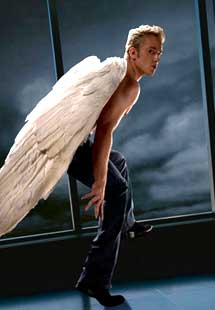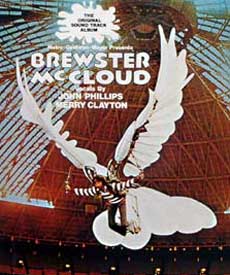 Throughout the 1970s, in Seattle, Brewster McCloud (1970) was one of those films that was periodically revived to good audience attendance & seemed, however marginally, to have become part of the cultural fabric of the city, though no where near as big & regularly shown as Bud Cort's other biggest starring vehicle, Harold & Maud (1971).
Throughout the 1970s, in Seattle, Brewster McCloud (1970) was one of those films that was periodically revived to good audience attendance & seemed, however marginally, to have become part of the cultural fabric of the city, though no where near as big & regularly shown as Bud Cort's other biggest starring vehicle, Harold & Maud (1971).
Here Bud Cort plays Brewster, a strange young man who lives secretly in the Huston Astrodome in some hidden room people seem to have forgotten exists.
Despite the flippancy of the plot, & many scenes of pure satire, Bud Cort's Brewster is edgy enough & so odd that it's impossible to quite get a handle on his motivation, & he's not just someone to evoke laughter. He is very bird-like in his behavior, lending him an inhuman quality, if not merely an all-too-human obsessive compulsive illness. He's at least as disturbing as he is amusing to watch.
When his singleminded focus nearly expands to embrace love, it is because the girl who might actually like him for all his oddness is herself rather like a bird, as played by Shelley Duvall in her debut film performance.
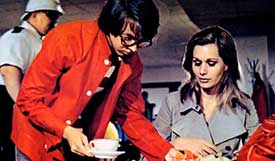 The fantasy element is not strong until we see the scars of wing amputation on Sally Kellerman's back. We may assume thereafter, if we wish, that Brewster's obsession for personal flight is inherited & not merely mental illness. The fantasy element is not strong until we see the scars of wing amputation on Sally Kellerman's back. We may assume thereafter, if we wish, that Brewster's obsession for personal flight is inherited & not merely mental illness.
But largely the film does not have many definitive fantasy elements, but only fabular potentials. So Brewster may be only a very, very introverted nut rather than an outsider genuinely of another species.
He's not all that easy to sympathize with, & Altman assiduously avoids being too cute or whimsical in a story that almost any other director on earth would've treated as whimsy. It is, rather, Felliniesque in strangeness of mind & event.
Superficially it seems more "plotted" than most Altman films, but in fact it meanders from moment to moment as do most Altman movies, with at least critical moment imbedded in every scene infusing it with poignancy & foible.
Brewster is constructing a pair of strap-on angel wings & spends pretty much the whole story focused on his goal of flight, which in the climax will be achieved inside the Astrodome, the young man flapping round & round & crying out like a frightened bird -- as if in horror of his longed-for achievement.
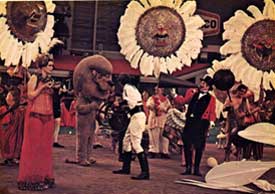 In the same moments of his obsession's fruition, he is destroyed by it, or by the world that has pursued him as a trespassing criminal or as an ornithological wonder. In the same moments of his obsession's fruition, he is destroyed by it, or by the world that has pursued him as a trespassing criminal or as an ornithological wonder.
There's an underlying symbolism that would seem to posit Brewster as "Island," or man without hope or companionship, possessing nothing but futile dreams that, even if achieved, cannot stay the ultimate darkness.
Yet the film doesn't take itself seriously enough to be gloomy. It is a comedy, & though having serious content it is always tongue in cheek. It steps along a tightrope between absurd humor & sinister cynicism, & when cynicism wins out, it is cause for a celebratory parade.
In fact the ending is so strange a kick in the pants that the first time I saw it when just a young filmgoer, I was disappointed by its overt silliness, having personally taken Brewster a little too seriously, having dreams of my own after all. But with time the ending came to seem better than any other ending one can imagine. Most alternatives would've resulted in outright corn.
I don't know if it would have the same effect on younger generations, but those of us old enough to remember the times it reflects will always embrace Brewster McCloud as the epitome of cult classic, a film possibly not for everyone, but precious to those who comprehend its sad, nostalgic, dreaming heart.
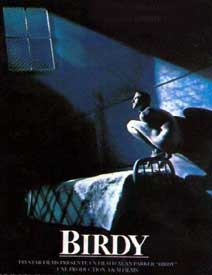 My dream doublebill for a big screen was for a long time Brewster McCloud playing with Birdy (1984). The pairing arose in my mind initially because of the shared central image of possessing personal wings. My dream doublebill for a big screen was for a long time Brewster McCloud playing with Birdy (1984). The pairing arose in my mind initially because of the shared central image of possessing personal wings.
There was additionally something about Birdy that was even further off the deep end of serious & severe, in spite of a central visual content that would invite comedy.
It was a long time before I slapped my own forehead with a "doh!" realizing Alan Parker has always been, in fact, something of an Altman acolyte, & so of course these two films fit together.
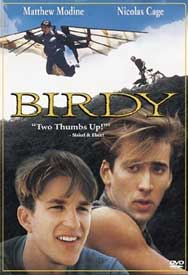 Brewster was a darkly comic fantasy with enough frivolity to fool the viewer into perceiving it lightly. Birdy invites no such option for pure comedy. It is consistently tragic, its moments of light achievable only by madness. Brewster was a darkly comic fantasy with enough frivolity to fool the viewer into perceiving it lightly. Birdy invites no such option for pure comedy. It is consistently tragic, its moments of light achievable only by madness.
It is the story of lifelong friendship in the Viet Nam era, about two young boys who go off to fight in Viet Nam & return home disturbingly altered, one by physical injury & deformity, the other by an intensified certainty that he was supposed to have been a bird, & finding comfort in a nearly catatonic withdrawal into fantasy.
In flashbacks we see Al (Nicholas Cage) & Birdy (Matthew Modine) developing their youthful friendship in the mean streets of Philadelphia, up to their horrific experiences in Viet Nam, to their reuinion in a veteran's hospital.
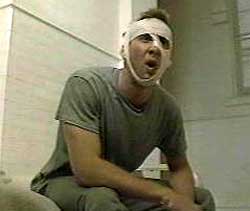 The story of just their friendship would've been enough to fashion a great movie, but the visual element of Birdy's fantasy of personal flight adds a uniquely cinematic grace beyond the surprisingly fine acting. The story of just their friendship would've been enough to fashion a great movie, but the visual element of Birdy's fantasy of personal flight adds a uniquely cinematic grace beyond the surprisingly fine acting.
Al could easily be destroyed by his own injury, but his doctor imposes on him to focus his attention on the needs of his friend, making it Al's responsibility to call Birdy out of the depths of madness.
When not in the midst of flashbacks, they have after their war experiences what approaches a Rain Man relationship, Al trying to drag Birdy back into normalcy but never quite succeeding. Instead, Birdy manages subtly & slowly to pull the much more rational Al into his world, for a finale that is full of dreamy, dreaming hope & agony.
For both Brewster McCloud and Birdy, personal flight, the possession of the wings of a bird, symbolizes the ultimate liberation of the human spirit. Brewster's story is a comedy that ends with that spirit crushed & with laughter over the ruin of his existence. Birdy's story is full of ache & depression, but with the dream uncrushed, possibilities sustained. Two fine films that seem almost to reflect into one another.
copyright © by Paghat the Ratgirl
|
